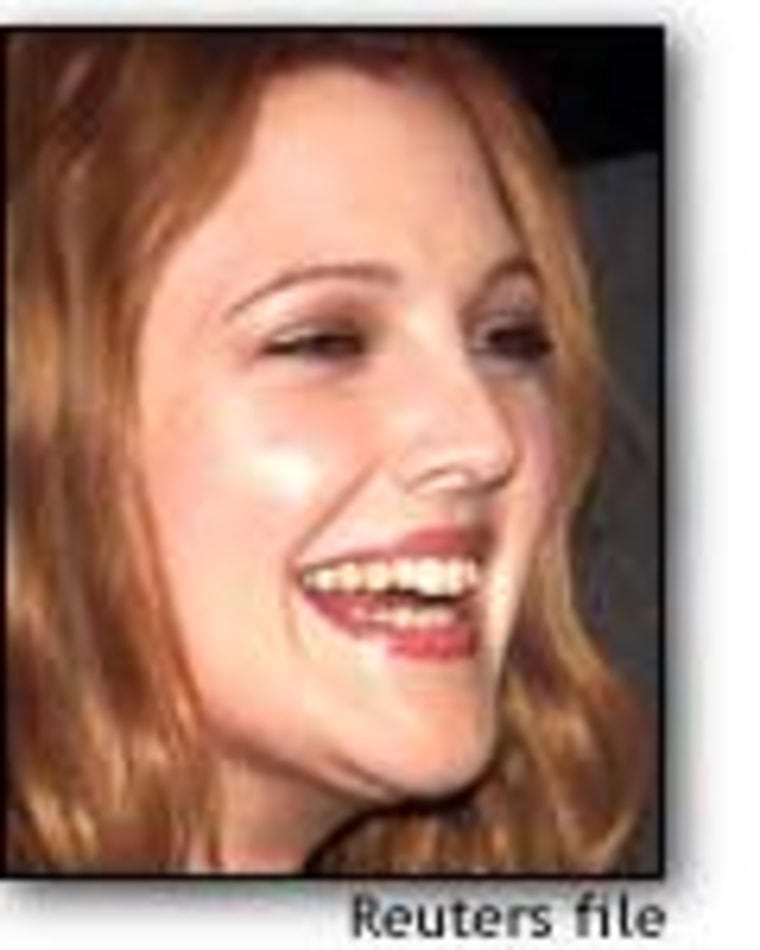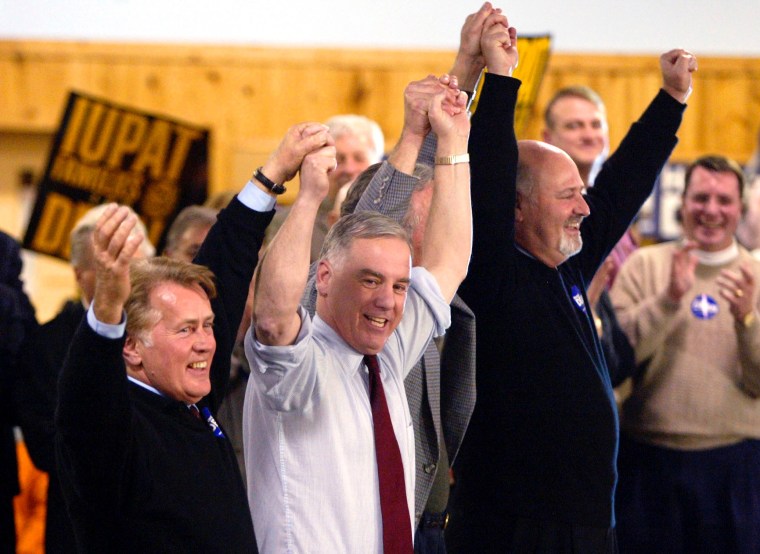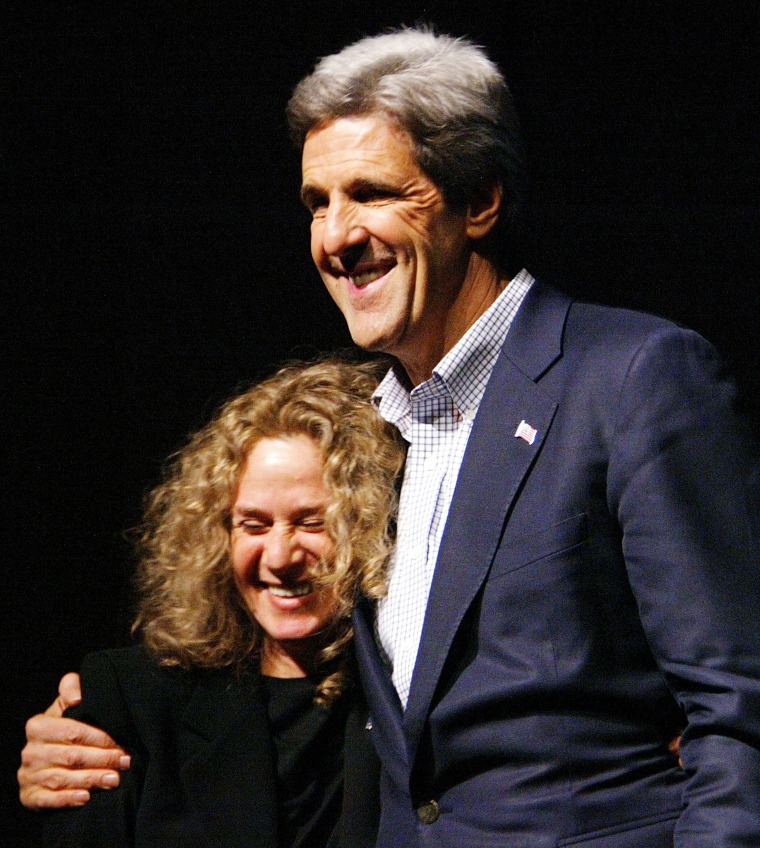With the new year and the new political season comes that hardy quadrennial, the celebrity endorser, from out of the woodwork and into the limelight. A survey of some stars and candidates finds America’s pop-cultural constellation backing the whole range of Democratic presidential aspirants.
Film director and author Michael Moore endorsed Wesley Clark on Jan. 14: "That's right, a peacenik is voting for a general. ... I believe that Wesley Clark will end this war. He will make the rich pay their fair share of taxes. He will stand up for the rights of women, African Americans, and the working people of this country. And he will cream George W. Bush," Moore said on his Web site.
Moore climbed on the Clark bandwagon a month after that student of American politics, Madonna. "I endorse him because I think he's a great guy," she told CNN, describing him as a "natural born leader."
And singer-songwriter Carole King entered the campaign fray on Jan. 16, saying that Sen. John Kerry has the “integrity and dignity” to be president. “His whole career has been true and steady to the core Democratic values I’ve always believed in,” she said in a Manchester Union-Leader story reprinted on the John Kerry Web site.
One hand washing the other
What’s less clear is whether the luminaries who matter — the anonymous souls at the voting machines — think pop culture’s boldface names make any difference in the way they vote.
There's a symbiotic relationship — maybe the word is really “parasitic” — between candidates and celebrities: Candidates need that touch of stardust, that undefinable magic that’s Hollywood’s stock in trade, to make them a little less bland and pedestrian, less like ... politicians.
Candidates also need celebrities for their ability to raise money on their behalf. Celebrities need candidates for the civic gravitas they impart — something at odds with the frivolous, insubstantial nature of stardom.
But how important are celebrity opinions to voters, and their Election Day decisions?
Few 'empty vessels'
For Larry Sabato, director of the Center for Politics at the University of Virginia, and a longtime observer of the celebrity role in American politics, it’s not even an issue. “My take on celebrity endorsements is that the only weak minds they can sway are fortunately not registered voters, or they don’t show up at the polls.
“Very few Americans are empty vessels into which celebrities or the media can pour opinions,” Sabato said. “Celebrities don’t sway any voters with substantial gray matter. I mean, who would vote for someone because Ben Affleck is for them? They’d have to be a blithering idiot. Generally, the blithering idiots are in the movie theaters on Election Day.”
It’s not that star power doesn’t have its place, he said. “Celebrities still matter. They attract media in droves and media coverage permits the candidate to get across his or her message,” he said. “It’s unpaid media that may have more credibility than paid media. That’s the impact. The celebrity creates an opportunity for the candidate to get a message across, but the candidates have to do the selling job.
Behind the process, not the player
“The average local union president is more valuable than any of those stars because the union guy can produce votes,” Sabato said. “Celebrities? Most of them couldn’t get their spouses to endorse their choice. This is of great fascination to readers of Variety, and not to any real people — thank goodness.”

Some celebrities hope to make an impact on the race by endorsing participation in the electoral process itself.
In November, actress Drew Barrymore and TV producer Norman Lear announced their role in launching Declare Yourself, a nonpartisan national youth voter initiative seeking to increase voter education and registration among Americans.
The campaign has raised $27 million in private and corporate donations, Lear said at a press conference. Other actors who intend to participate include Cameron Diaz, Edward Norton, Michael Douglas and Kevin Spacey, he said.
Everyone's ‘A’ list
Money confers potential, invokes its own celebrity. Howard Dean, seen until recently as the presumptive Democratic nominee, has long been out in front in fund-raising.
Dean raised more than $15 million in the fourth quarter of 2003, his campaign announced on Dec. 31, breaking his previous quarter's total of $14.8 million. That puts the campaign's total 2003 fund raising at more than $40 million.
Maybe accordingly, the list of some of Dean’s supporters is a snapshot of some of Hollywood’s A-list: Martin Sheen, Whoopi Goldberg, Michael Douglas, Catherine Zeta-Jones, Al Franken and Larry David are among them.
Singer-songwriter Melissa Etheridge endorsed Dean in November, just before the politically populated Jefferson-Jackson Dinner in Des Moines, Iowa.
Besides Carole King, Kerry has reportedly corralled actors Dennis Hopper and Kathleen Turner, musicians Kenneth “Babyface” Edmonds, Moby and James Taylor; writer Aaron Sorkin; and music producer-entrepreneur Quincy Jones.
The Washington Post reported Nov. 10 that Rev. Al Sharpton counts Black Entertainment Television founder billionaire Robert L. Johnson; Cathy Hughes, chair of Radio One Inc.; and hip-hop entrepreneurs Russell Simmons, Sean “P. Diddy” Combs and Jay-Z among his supporters.
Ohio Rep. Dennis Kucinich boasts celebrity endorsements that include actors Ben Affleck, Danny Glover, Ed Asner and Joaquin Phoenix; author Studs Terkel; and singers Willie Nelson and Michelle Shocked.
Celebrities as candidates
Curious differences of opinion surface among presumed political bedfellows. While Sheen — President Josiah Bartlet on NBC’s “The West Wing” — backs Dean for president, Sorkin (who created “The West Wing” and the character Sheen portrays) is in Kerry’s corner. Reiner is a Dean man, while director Penny Marshall (Reiner’s ex) favors Kerry.
Maybe California is again ahead of the national curve. With figures from George Murphy (elected senator) to Ronald Reagan (elected governor, then president) to Arnold Schwarzenegger (sworn in last year as governor), California has shown there’s maybe an ideal intersection of the celebrity-candidate relationship — when the celebrity becomes the candidate.
“Ah, that’s a different matter,” Sabato said. “A celebrity endorsement rarely affects any campaign significantly, but a celebrity who is a candidate starts out with two big advantages: wealth and high name identification.
“That combination can produce a party nomination in many cases,” he said. “General elections aren’t determined as easily by just money and name ID, since other basic factors come into play: the party balance of the constituency, the issues dominating the campaign, pluses and minuses of the other party nominee.

“But it’s a rare party chairman who wouldn’t happily settle for an intelligent, politically oriented celebrity to carry the party’s banner in most years.
“Notice I said ‘intelligent’ and ‘politically oriented,’” he added.
“Airheads and novices, famous or not, usually implode during a campaign. Fame and money help a person win, but in and of themselves, they aren’t enough.”
For one, a low-wattage campaign
“I’ve been thinking that in this campaign, we’ve had a pretty low-key campaign for celebrity endorsements,” said Craig Crawford, a columnist and special contributor for Congressional Quarterly, and an MSNBC analyst.
“I don’t think any of these candidates have turned on the celebrities — just as they haven’t turned on the voters.” It may be early yet, he suggested.
“Victory confers some degree of celebrity,” Crawford said. “Winning primaries and getting the attention of newsmagazine covers and such will help, but this is not a high-wattage group when it comes to the cult of personality.”
“I think that the novelty has worn off celebrity endorsements, to some extent,” said Crawford. “I think people are a little more jaded about celebrities endorsing politicians than they used to be.”
Overshadowed by supporting cast
To Crawford, one problem for candidates hoping to bask in the ambient glow of a celebrity’s presence is the chance of being upstaged by that candidate.
“Candidates who aren’t celebrities themselves run a risk of campaigning with people who are bigger celebrities than they are,” Crawford said. “Bill Clinton could bring a celebrity along with him, and it’s a close call as to who’s the bigger celebrity.”
And sometimes, he said, the stardust factor of celebrity isn’t what it’s cracked up to be. “I remember being here [in Iowa] when Richard Gere was campaigning for Michael Dukakis in 1988,” Crawford said. “Those two didn’t even speak the same language. Gere would go on talking about the Dalai Lama, but Dukakis was utterly clueless.”
Crawford, who said he spent a month in California monitoring the Schwarzenegger gubernatorial campaign, noted what he saw as the irony of a relative absence of celebrities involved in that campaign — in the state where they’re all but a natural resource.
The one that got away
“I spent a month out there on that campaign, and I was constantly commenting on how the Hollywood people kept their distance from that campaign,” he said. “They were kind of a non-entity in the race.”
“The biggest problem with this field is that there are no celebrity candidates,” he said. “They haven’t been able to become celebrities even within the Democratic Party.”
In this presidential campaign, the celebrity candidate is a rare political event. For Crawford, the one celebrity conspicuous by her name and presence on everything — except the papers announcing intent to run — was Sen. Hillary Rodham Clinton, the one that got away.
“I spent a total of six hours watching Hillary Clinton — and there’s your celebrity,” Crawford said. “She was mobbed for autographs at the Jefferson-Jackson Dinner. She was the last one to leave the room.”
